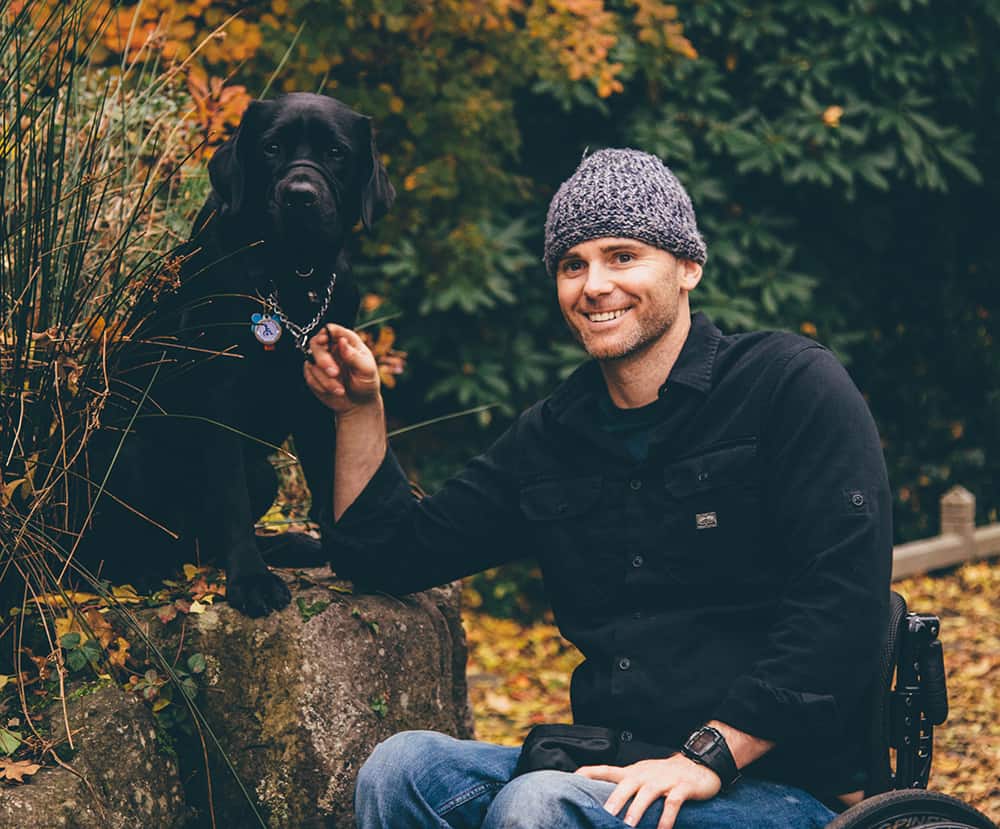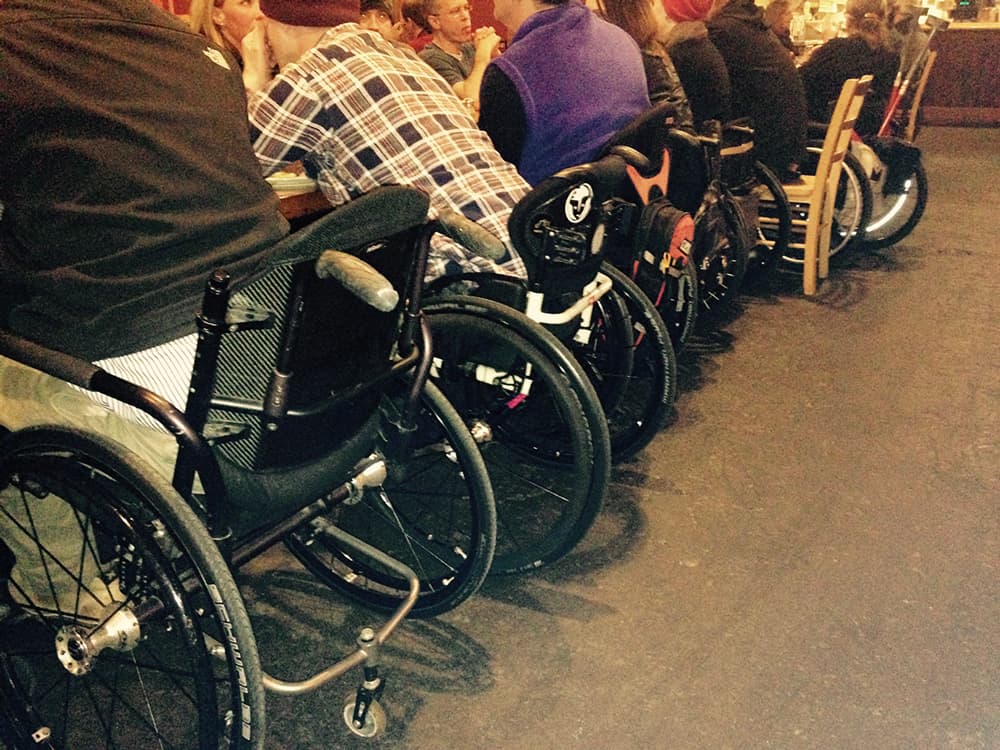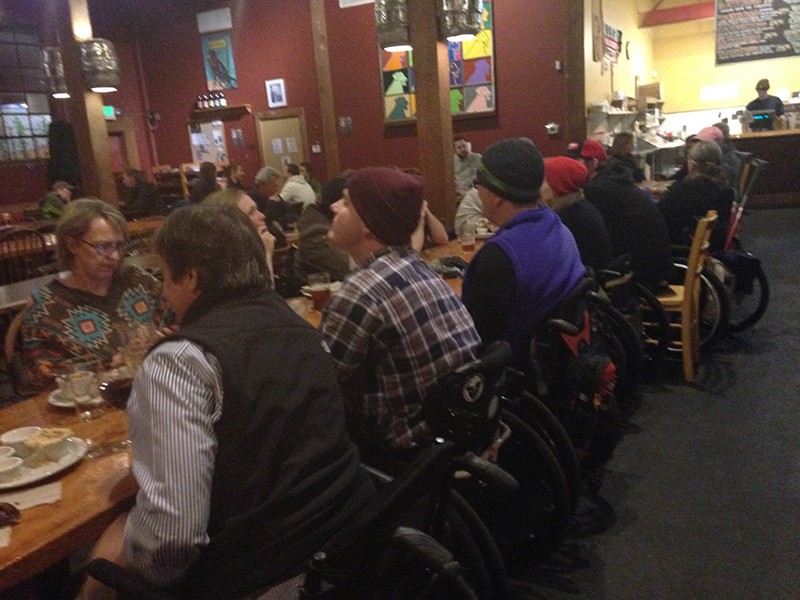Spotlight: Portland
My Take
After 18 years living here as a wheelchair user, I’ve adapted to the gray, overcast weather and I’ve learned to appreciate the “sun breaks” (as our weather forecasters so proudly call the respites of sun). I am not alone. The Portland metropolitan area has a good-sized wheelchair-using community — people who tolerate the drizzle and gray in return for the accessible bounty offered by one of our country’s lushest regions.
If you are worried about washing away in a deluge, know that Portland averages 43.5 inches of rain per year. That is less than New York (49.9), Boston (43.8) and Atlanta (49.7) and on par with places not associated with rain, like Cincinnati (41.9) and Washington, D.C. (39.7). That said, Portland has the third-most rainy days of any big city in the nation (164), trailing only Buffalo and Rochester, New York. It rarely rains hard, but we do have lots of gray, drizzly days. But summers are perfect and, as long as you don’t mind cloud watching, the rest of the year is pretty mild. I have had great success avoiding the rain. My chair has only died from waterlog twice.
Skinny on the City
Portland offers much more for wheelchair users than the incessant rain and surplus of hipsters that popular media present. An amazingly accessible transit system, easy access to year-round skiing and beautiful beaches and one of the country’s most vibrant music and food scenes ensure that Portland has something accessible and amazing for just about everyone.
Places to Go
One of my favorite places to go in Portland is Council Crest, a park that doubles as the highest point in the city. On a clear day, you can easily see the looming majesty of Mount Hood, a decapitated Mount St. Helens, the peaks of Mount Adams and Mount Rainier and a huge swath of the fertile Willamette Valley. Literally, you find yourself surrounded by beauty and easily accessible destinations for a hike, picnic or simple outing. It’s easy to understand why a former governor here famously said, “Come visit us again and again. This is a state of excitement. But for heaven’s sake, don’t move here to live.”
Another accessible highlight is the Springwater Corridor Trail, a 20-plus mile paved path that runs along the Willamette River through downtown and into the country. Start your wheeling or handcycling adventure on the brand new Tilikum Crossing (in photo), the first major bridge in the United States designed to allow access to transit vehicles, cyclists and pedestrians, but not cars. Keep your eyes open for bald eagles and other wildlife as you swing by Oaks Bottom Refuge and decide just how far you want to push yourself.
Getting Around
Thanks to an intricate network of fully-accessible buses, light rail, and street cars, getting around town is a snap. A wheelchair van makes ramping around town easy, as parking is free downtown and in any metered spots for wheelchair users. Portland also has a decent number of accessible cabs, should you need a late night ride or something else out of the ordinary. While Portland’s western edge is bounded by hills, the downtown and eastside are mostly flat and easily rollable.
Available Healthcare
With three large hospital systems (Legacy, Providence, Kaiser) and internationally renowned Oregon Health Sciences University, there is an abundance of medical expertise around. I did my rehab at the Rehabilitation Institute of Oregon, part of the Legacy system, and have been impressed by the care I’ve had access to. Befitting its alternative image, Portland also boasts a number of alternative medicine options, including the National College of Natural Medicine, the oldest accredited naturopathic medical college in North America.
Must See, Must Do
Restaurants: Portland City Grill’s views from 30 floors up are too good to pass up, as are the steaks and fresh Northwest seafood. Or try Departure, with a modern, fusion-Asian menu and cocktails from around the world — also with a view.
Venue: Powell’s City of Books is the biggest and best bookstore you will ever go to. Seriously. It takes up an entire city block and houses over a million books.
Movies: Across the street from Powell’s, enjoy the ultimate comfort in a movie house. Living Room Theaters has small, HD screens, hard-to-find flicks, and wine and beer delivered to your recliner.
Chapter Check-In
Oregon Spinal Cord Injury Connection Gains Steam
by Maureen Gazda
Pizzas are sizzling in the oven, specialty beers are flowing from the tap, and lively tunes are blasting throughout the bar. It’s just a typical, crowded last Monday at The Lucky Lab Brew Pub in Portland, Oregon. And although the atmosphere is already rocking, when West Livaudais and his crew arrive around 6:30 p.m., the place really gets rolling. Livaudais is the founder of The Oregon Spinal Cord Injury Connection and the monthly Wheel Connect gathering, which brings the local SCI community together for a social evening to gather support and share experiences.
“When we started a little over a year ago, we only had five people show up. Now the group has grown to 35, with family and friends sometimes making it 50,” Livaudais says. “We have become close and have developed a camaraderie and strength together through our relatable stories.”
For Livaudais, that story began back in 2013. Having always possessed a deep desire to help people, Livaudais was living in Guatemala working for Medical Teams International as the maternal and child health program coordinator when he was hit by a truck and sustained a severe hip injury. Livaudais returned to Portland immediately. Complications followed and he developed a dangerous infection and abscess, which ultimately pinched his spinal cord, paralyzing him at the C7 level.
Livaudais says the idea for Wheel Connect came to him on a whim while having a drink after therapy with a friend who was also used a wheelchair. “I thought, why can’t we make this a group thing?” he says. “We started to invite a few more people, and the whole idea kind of blossomed from there.”
Wheel Connect was the first step, and from that Livaudais created the Oregon Spinal Cord Injury Connection to help those with spinal cord injuries throughout the state of Oregon. “Oregon SCI Connection is a group for all those affected by spinal cord injury, new and veterans alike,” Livaudais explains.
In addition to Wheel Connect, The Oregon SCI connection has also created a forum to open dialogue between people with spinal cord injury and health care professionals to help transition to life after rehab. The forum covers a variety of issues, including emotional, physical and psychological obstacles that the SCI community faces. The meetings typically take place at the Rehabilitation Institute of Oregon in Portland. Recent workshops and discussions have included dating and relationships after SCI, regaining independence through transportation, and a discussion among women with SCI, just to name a few.
The Oregon SCI Connection recently became an affiliated chapter of United Spinal Association, a big step in furthering the reach of the organization beyond Portland and throughout the entire state, according to Livaudais.
He plans to launch an SCI peer mentoring program, which would train experienced people with SCI to help individuals with new injuries. “I imagine developing a community health outreach program that would improve the health outcomes and social and emotional adjustment of those recently discharged with SCI. Veteran wheelers with SCI are qualified to be community health coordinators because they have knowledge of the difficult adjustment to this new life,” he says. “As community health coordinators, they would collaborate with local SCI rehab programs and home health to outreach to newly-discharged people with SCIs and their families.”
Although his path may have suddenly changed, Livaudais says he is still fulfilling his desire to help people, but just in a different way.
“It was through my work with Mayan mothers in rural, indigenous communities in Guatemala that I learned how to utilize the dynamics of community engagement to leverage a community’s strengths to promote health,” he says. “Ultimately, I want to strengthen and engage others to promote their own health and well-being. Now, finding myself in the SCI community, I want to use my experience and training to build this community to promote its own strength. We’ll learn as we go.”
Wheel Connect meets on the last Monday of the month from 6:30 p.m. to close at the Lucky Lab Brew Pub, 1495 NW Quimby Street, in Portland. For more information on The Oregon Spinal Cord Injury Connection, visit www.oregonsci.org.
Support New MobilityWait! Before you wander off to other parts of the internet, please consider supporting New Mobility. For more than three decades, New Mobility has published groundbreaking content for active wheelchair users. We share practical advice from wheelchair users across the country, review life-changing technology and demand equity in healthcare, travel and all facets of life. But none of this is cheap, easy or profitable. Your support helps us give wheelchair users the resources to build a fulfilling life. |






Recent Comments
DINOS PITSILLIDES on Functional Fitness: How To Make Your Transfers Easier
Stosh on Functional Fitness: How To Make Your Transfers Easier
Bill on LapStacker Relaunches Wheelchair Carrying System